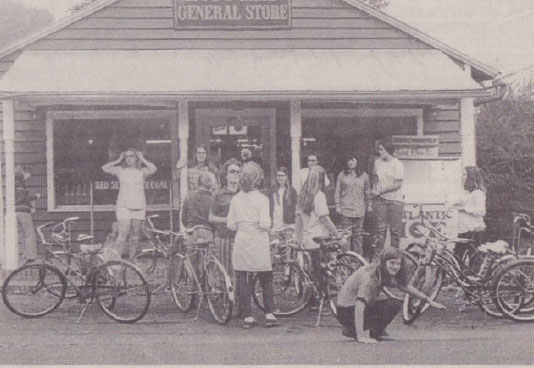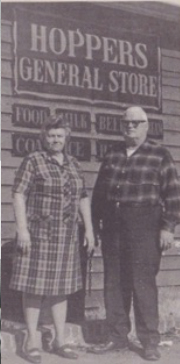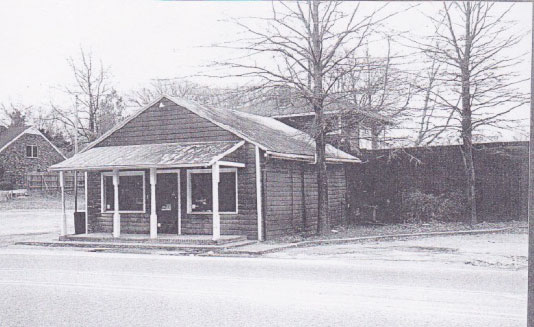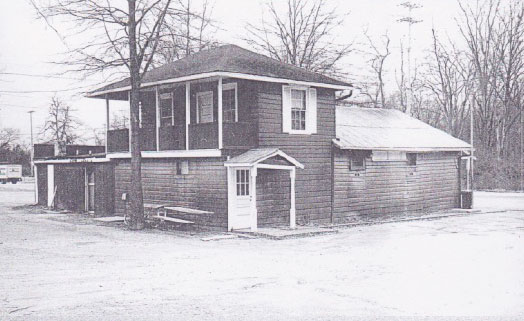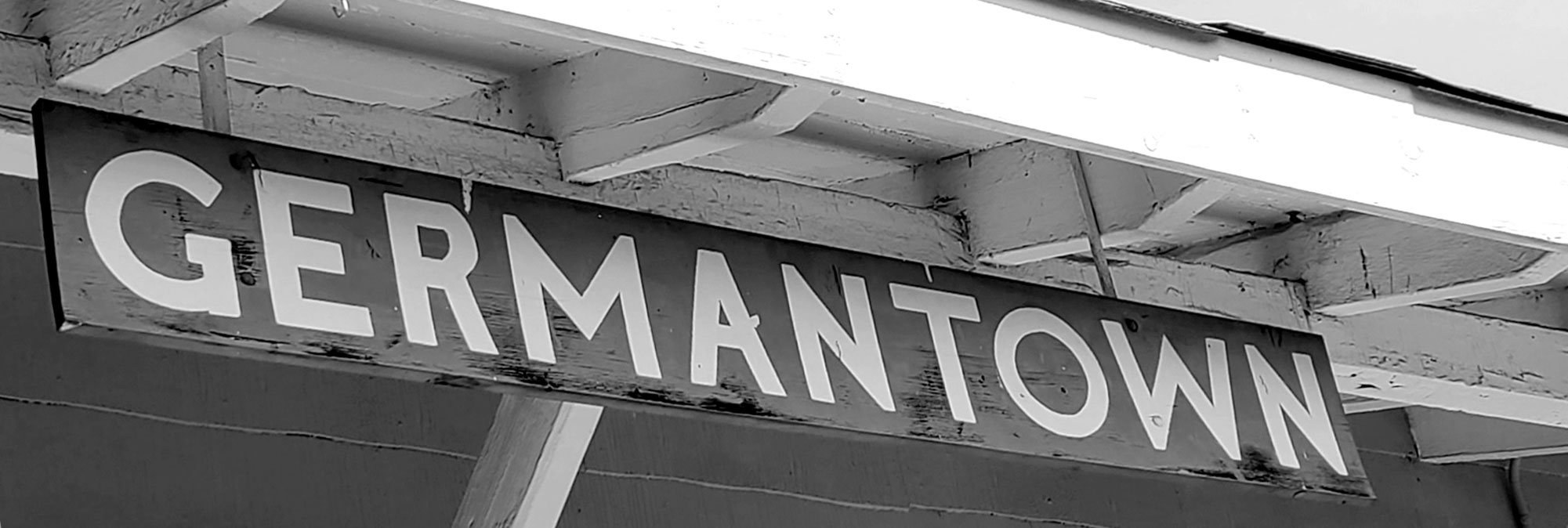
Hopper’s Store
By Anna Lue Cook
One of the oldest, continuously operated businesses in Germantown is about to become only a memory. After 77 years of serving a community as a grocery store and convenience store, the old, red store with the green roof at 2574 Germantown Road South will be torn down to make way for road construction. Located only a few feet off the busy throughway of Germantown Road, one can see why road improvements would call for the demise of the structure. Second and sometimes third generation customers have stopped by the store for grocery items, lunch or gasoline over the years.
According to Alio Lunati of Germantown, his father, Frank Lunati built the store in 1919. H.L. LaCroix, a local bricklayer at that time, and Mr. Chandler, a local carpenter at that time, built the store. An addition was built on to the original store in 1921and in 1933. Mr. Lunati added a beer garden at the rear of the store and a two-room apartment was built on the top. Frank Lunati and his family lived in the white house located to the rear of the store.
Frank Lunati and his family operated the store known as Frank Lunati’s Grocery from 1919 until 1946. As one walked into Frank Lunati’s Grocery 77 years ago, smells of salt pork, lard, P&G Soap, and Dean’s Coffee greeted you as you walked across the board floor with cracks between each plank large enough for a coin to be lost forever. A potbellied heating stove occupied space in the one-room store. Frank Lunati was known as the tri-state checkers player. Players from Mississippi and Arkansas came to take part in the checkers games played by that old potbellied stove. A loaf of bread sold for 5 cents and came unsliced. A gallon of gas sold for 10 cents. A dozen eggs sold for the same price. A belly washer, a popular cold drink sold at that time, cost 5 cents. Men were paid 50 cents or less for a day’s work.
Frank Lunati opened the store at 7 a.m. each morning and closed at 9 p.m. All staple grocery items, meats, sewing needs, clothing, shoes, feed, dry goods, and over-the-counter drug items were sold in the store. There were two, hand-operated Gulf gasoline pumps out in front of Frank Lunati’s Grocery. Each pump had a large glass bowl at the top that held 10 gallons of gasoline. Each glass bowl was marked off in 1-gallon measurements. The grocery store also sold kerosene.
Some of the staple grocery items that were sold were flour, sugar, lard, salt, coffee, meal, meat, bread, soap, and washing powder. In the early years, flour was bought and sold by the barrel or the 24, 48, or 98-pound size cotton bags. Sugar was bought by the bulk and put into a bin. Customers would buy the sugar by the pound from the bin. Coffee was also sold from the bin. Salted, side meat was sold by the pound from the meat bin. Lard was sold by the can or by the pound from a very large can.
Frank Lunati would charge grocery items for farm families and sharecroppers for a month at a time. At the end of the month, he expected to be paid. During the depression years, many of the grocery items he sold were never paid for. People just did not have the money during those hard years to pay their bills, but their families still had food on the table because of Frank Lunati. Some farm families would raise chickens and when they had extra eggs, they would bring those to Frank Lunati’s Grocery and trade them for grocery items or gasoline. Mr. Lunati would then sell the eggs to other customers for 10 cents a dozen.
Lunati’s Grocery did not have a cash register or adding machine. The grocery items that were bought were written down on a brown paper bag and added up, and then the grocery items were put in that same bag to carry home. The customer had his receipt for his items right on the bag he carried home.
In 1946, the Lunati’s divided the property into two parts. The part with the store and old home was sold to Frank Lunati’s daughter, Elsie and her husband, J.B. Bowling. The other half was sold to Frank Lunati’s son, Alio Lunati. Mrs. and Mrs. ALio Lunati built a spacious brick home on their property. Mr. and Mrs. J.B. Bowling operated Lunatii’s Grocery for several years and sold the store and property to Mrs. and Mrs. Reeves Hughes.
Mr. and Mrs. Hughes never operated the store. They rented the store to Mr. and Mrs. Eason Hoppers. According to Dolores Morrow, Mr. and Mrs. Hoppers’ daughter, Eason and Grace Hopper operated the store known as Hoppers General Store, from 1967 until. 1978. Mrs. Morrows helped operate the general store through those years, also. Hoppers General store sold staple grocery items, ice, coal, hay, pickled eggs, pickles, sausages, and served lunch at noon. Many customers came just to buy the famous hoop cheese sold at Hoppers. During the early years of Germantown’s housing boom, workers had few places to eat lunch in Germantown. Many came to Hoppers to buy sandwiches, beans, coffee, and cold drinks for lunch. According to Mrs. Morrows, lunch began at 10:30 a.m. and ran through 1 p.m. Many times, the lunch line would fill the store and continue outside. Mrs. Morrow recalls workers from all walks of life coming by the store for lunch. Many of the lunch customers ate there each day.
An atmosphere of home was felt at Hoppers General Store, and everyone was welcome. Children loved to stop by and were usually given free candy. There was a potbellied stove in the general store during the years that the Hoppers operated the store. The coffee pot was always on, and friends sat around the stove visiting. Two special friends of Grace and Eason Hoppers were Edna and Bubba Burford. Mr. Burford was the first city manager of Germantown.
In 1979, Mr. and Mrs. Reeves Hughes sold the store and property to A.B. Dixon. Mr.Dixon never operated the store but leased it. David and Anna Jones were the last people to lease the store. The store was known as D.J.’s Grocery Deli when it closed. At the time it closed, the main attraction was the noon lunch served.
The old country store at 2574 Germantown Road South that withstood time with dignity and offered service to so many is now empty, just waiting for the final blows that will make it only a pile of rubble. Many times progress takes our structures that have historical value.
Sources
“Old store on Germantown Road to be torn down”, Anna Lue Cook, The Shelby Sun Times, May 16, 1996, p. 36.

